Let’s go on an adventure… (Expeditions: Conquistador Review)
Shortly before Cortez set sail on his grand adventure which would take its place in the history of exploration’s hall of fame, another crew set sail on an expedition of its own; your crew. Expeditions: Conquistador is a turn based strategy game 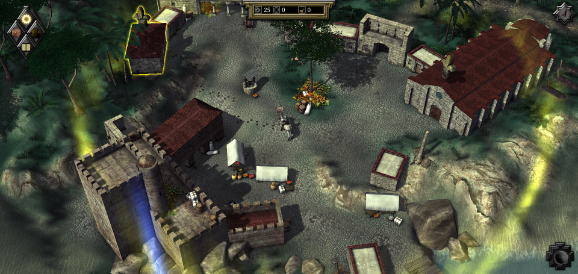 which sees you Captain your own crew on an adventure which will test your abilities to explore, survive and fight your way to fame and fortune. This strategy game is unlike those which might be seen as the norm, testing far more than simply your ability to think, move and shoot your way around different landscapes. Here you will be put in control of every aspect of your crews actions and therefore their fate. If you want to explore these intriguing, fruitful, and deadly lands, you will need to be prepared to take the full responsibility for the lives of those who follow you in order to survive and succeed.
which sees you Captain your own crew on an adventure which will test your abilities to explore, survive and fight your way to fame and fortune. This strategy game is unlike those which might be seen as the norm, testing far more than simply your ability to think, move and shoot your way around different landscapes. Here you will be put in control of every aspect of your crews actions and therefore their fate. If you want to explore these intriguing, fruitful, and deadly lands, you will need to be prepared to take the full responsibility for the lives of those who follow you in order to survive and succeed.
The game feels, and in some ways looks, like an old-style strategy from the late 90s, for example the Age of Empires series. While the play style is very different to that franchise, this game has a similar atmosphere to it in the way that things look and interact. In some ways, it is like a cross between Age of Empires, Risk, and some sort of older role-playing game too. The elements of structuring your force for best results, careful placements and manoeuvres during battles and selective use of your resources are all present and combined into a neat bundle of strategy game goodness for you to entertain yourself with. In other words, while the game feels like an older style of 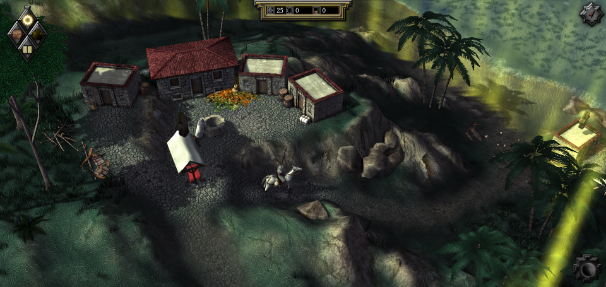 game when you play it, it has been carefully moulded to include the best elements of the things that have come before it. At the same time, it manages to maintain a healthy dose of uniquity too, so it should not be thought that because of its apparent inspirations there has not been a good level creativity involved as well.
game when you play it, it has been carefully moulded to include the best elements of the things that have come before it. At the same time, it manages to maintain a healthy dose of uniquity too, so it should not be thought that because of its apparent inspirations there has not been a good level creativity involved as well.
Your important role in the game begins immediately, as the first action you must perform is to select the people who will make up your crew. People may join you along the way in your travels, but this initial group are the ones who will give you support throughout and become your highest ranking and most capable followers. There are several classes of people from which to make your crew; doctors, scholars, soldiers, scouts and hunters. You may choose how many of these you choose to take with you, but you must choose wisely between your options based on what you hope to achieve. Each individual character from these classes has their own skills, traits and personalities to consider and the cohesion of the group could be the deciding factor between the success of your expeditions and their failure. You must be cautious of some characters being inherently racist or aggressive in your travels, but at 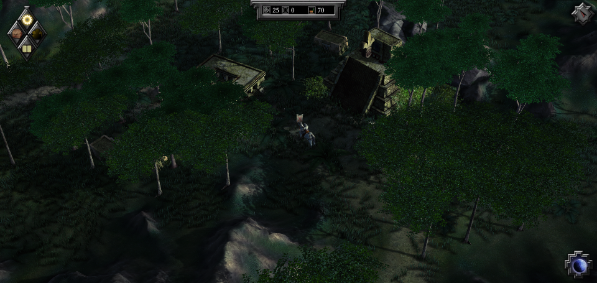 the same time it is o your benefit to choose those with skill and courage in order to secure the safety of the group. It will be up to you to decide who is important in making up your crew, and ultimately you who will have to work with the outcomes of these first important decisions.
the same time it is o your benefit to choose those with skill and courage in order to secure the safety of the group. It will be up to you to decide who is important in making up your crew, and ultimately you who will have to work with the outcomes of these first important decisions.
Once you have assembled a crew, you will find yourself docked as a colony where you find some trouble with the local management. The game works with a quest-based system and your story begins with you having to perform certain tasks in order to have control of your ship and crew returned to you. When you are playing in a city, you can move around freely and access any interactive elements using only the left mouse button. Much of the game is controlled very simply with the mouse, making control and quick playability very easy to learn and master. Aside from attaining and completing quests, the most important feature of the city locations in-game is the ability to trade supplies, medicine and equipment with a local trader. With an active economy, these items can become more or less expensive depending on the amount of them you buy or sell accordingly; another welcome, realistic touch to the game.
When you leave the security of a city, town or otherwise safe and colonised location, the nature of the game changes significantly and the element of strategy really comes into play. You can only make a certain number of moves each day at this point, after which you must stop and make camp for that night. This is not a simple click of the 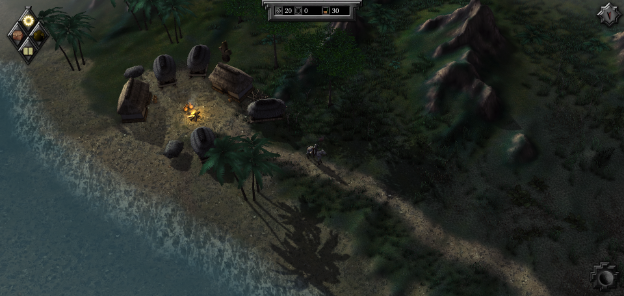 button situation however; rather it is one of the key, in-depth and highly strategic elements to the game. Firstly, you must hand out rations or meat to your crew in order to keep them alive. Giving crew members extra supplies at this point can also help to increase their morale. On top of this you must allocate jobs to each member of the crew for that night, such as patrolling, guarding, herbalism, tinkering, preserving meat or hunting. All of these roles pretty much speak for themselves and every one of them is important. Depending on the location in which you are camping however certain jobs on this list might be more difficult than others. For example, it is easy to hunt in a forest but more difficult to patrol it and guard the camp. In a mountainous location however it may be easy to guard your camp, but much harder to hunt and acquire meat. Different members of the crew can be better or worse at certain jobs than others, so it is crucial to allocate the right tasks in the right places to the right people. You must think carefully about priorities and keep a close eye on the difficulties of tasks each night to make sure you prepare the best possible strategy to survive another day.
button situation however; rather it is one of the key, in-depth and highly strategic elements to the game. Firstly, you must hand out rations or meat to your crew in order to keep them alive. Giving crew members extra supplies at this point can also help to increase their morale. On top of this you must allocate jobs to each member of the crew for that night, such as patrolling, guarding, herbalism, tinkering, preserving meat or hunting. All of these roles pretty much speak for themselves and every one of them is important. Depending on the location in which you are camping however certain jobs on this list might be more difficult than others. For example, it is easy to hunt in a forest but more difficult to patrol it and guard the camp. In a mountainous location however it may be easy to guard your camp, but much harder to hunt and acquire meat. Different members of the crew can be better or worse at certain jobs than others, so it is crucial to allocate the right tasks in the right places to the right people. You must think carefully about priorities and keep a close eye on the difficulties of tasks each night to make sure you prepare the best possible strategy to survive another day.
Even when you are not camping in the wilderness, there are things to be found around it. Herbs can be acquired to be turned into medicines at night. Treasures can help you when it comes to trading, particularly when some resources become more expensive due to supply and demand. Mapping out the explorable world is also important in learning the nature of the lands you are wondering, and particularly in finding your way back to civilisation after a quest. The vast majority of quests which you pick up 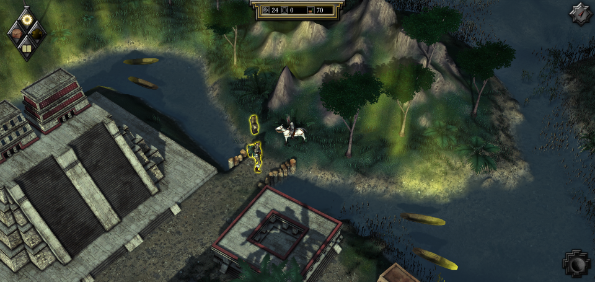 in cities, excluding some of the early, tutorial-style ones, will require you to head out into unknown territory, and when you reach your target the decisions you make could well influence your situation and your quest’s success. Both inside and outside of cities for example, you have a variety of options in conversations which can alter the way situations play out. Sometimes the ending will always be the same, but in other cases you may have the chance to choose between diplomatic or offensive approaches to certain situations.
in cities, excluding some of the early, tutorial-style ones, will require you to head out into unknown territory, and when you reach your target the decisions you make could well influence your situation and your quest’s success. Both inside and outside of cities for example, you have a variety of options in conversations which can alter the way situations play out. Sometimes the ending will always be the same, but in other cases you may have the chance to choose between diplomatic or offensive approaches to certain situations.
There are intricate systems in-game which allow for the improvement and progression of your crew as you play. Some parts of this are simple, for example you can purchase equipment, which in this game is generalised into this category rather than various specific items being on offer, which can improve the offensive and offensive abilities of your crew in battle situations. Other factors take a little more thought. You gain experience as you play, and this can be spent on increasing the ranks of crew members and improving their specific skills. You must choose which members of the crew to spend your experience on and promote, so you must consider the value of each crew member and their personalities and traits in your decision. When you promote someone, you can choose one bonus to apply to them, which can be anything 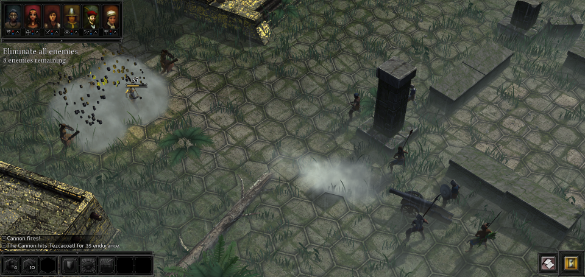 from increased attack or defence to improving certain profession-specific skills. You can also improve their ability to do certain jobs when camping in order to aid the overall ability of the crew at ensuring their survival.
from increased attack or defence to improving certain profession-specific skills. You can also improve their ability to do certain jobs when camping in order to aid the overall ability of the crew at ensuring their survival.
Last but not least, the final key element of the game worth mentioning specifically is the nature of the battles. These are turn based, so you can only make a certain number of moves or attacks, or use a particular ability so many times, per crew member per turn. You may not always be able to use your entire crew in a fight, so it is important to choose the people you believe will be of the greatest benefit to you if you can only take a handful into battle. It is also crucial to consider the defence of key crew members as the battle goes on, for example if you only have one doctor and they are slain, you may find yourself in a difficult situation later on even if the other crew members survive. The battles are a lot more tactical than epic and brutal, which fits nicely to the game’s overall style and given the small crew you control does make some sense. It can sometimes be confusing as to why you cannot hit a target at range when the enemy is often more able to do this, however as you improve your crew and their equipment it is fair to assume this becomes easier in the long-term. The battle style is easy to pick up and get used to so that you can stand a good chance of winning, and the practice-style battle which you must win before you fight in any truly dangerous situations sets you up nicely. In a full on battle you may find that crew members come out with injuries or do not make it out of a fight at all. This is when things can start getting tricky in terms of general survival and you may 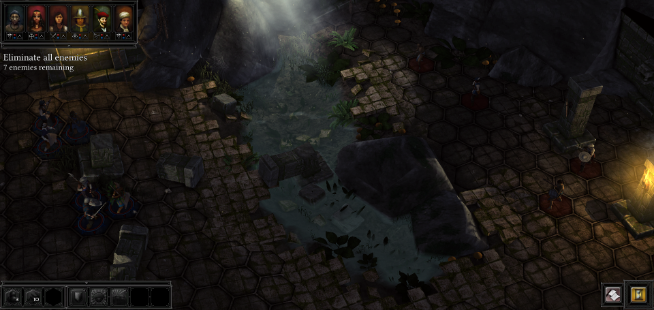 have to make sacrifices for the good of the many. In some battles you may be able to set up equipment such as barricades before the fight begins in order to try to give yourself the tactical advantage from the off. Careful thinking throughout the fight however is the only route to victory in this game.
have to make sacrifices for the good of the many. In some battles you may be able to set up equipment such as barricades before the fight begins in order to try to give yourself the tactical advantage from the off. Careful thinking throughout the fight however is the only route to victory in this game.
Expeditions: Conquistador is a fantastic little strategy game which incorporates the best elements of the strategy and role-playing games of old while adding new elements to construct what is a highly tactical, well thought out and exciting game to play. Every element of the game and the survival of the player’s crew is placed in the hands of the player to control; from exploration to camping to fighting. Straight from the off you are put in charge of your destiny as you select your crew members from a details and varied selection which will genuinely influence the way the game unfolds. While you follow a set storyline to an extent, you have the power to influence the direction of this story and very much make it your own. While high-end, modern graphics may have been sacrificed in this instance, this decision does not affect how enjoyable the game is to play, and can indeed be seen as a worthy sacrifice. All in all this is a game well worth picking up for fans of detailed strategy adventures and will certainly provide a great level of enjoyment and thought-provoking situations which will impress and entice strategy game fans in general.
The Good – a game which combines the best elements of role-playing and strategy games while adding its own unique touch to form a tactical, in-depth and exciting adventure for the player to create and explore.
The Not So Good – the look of the game has been the cost of its gameplay quality, so fancy, shiny graphics should not be expected in this instance.
Disclaimer:All scores given within our reviews are based on the artist’s personal opinion; this should in no way impede your decision to purchase the game.









You must be logged in to post a comment.